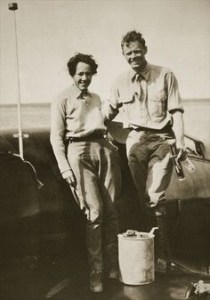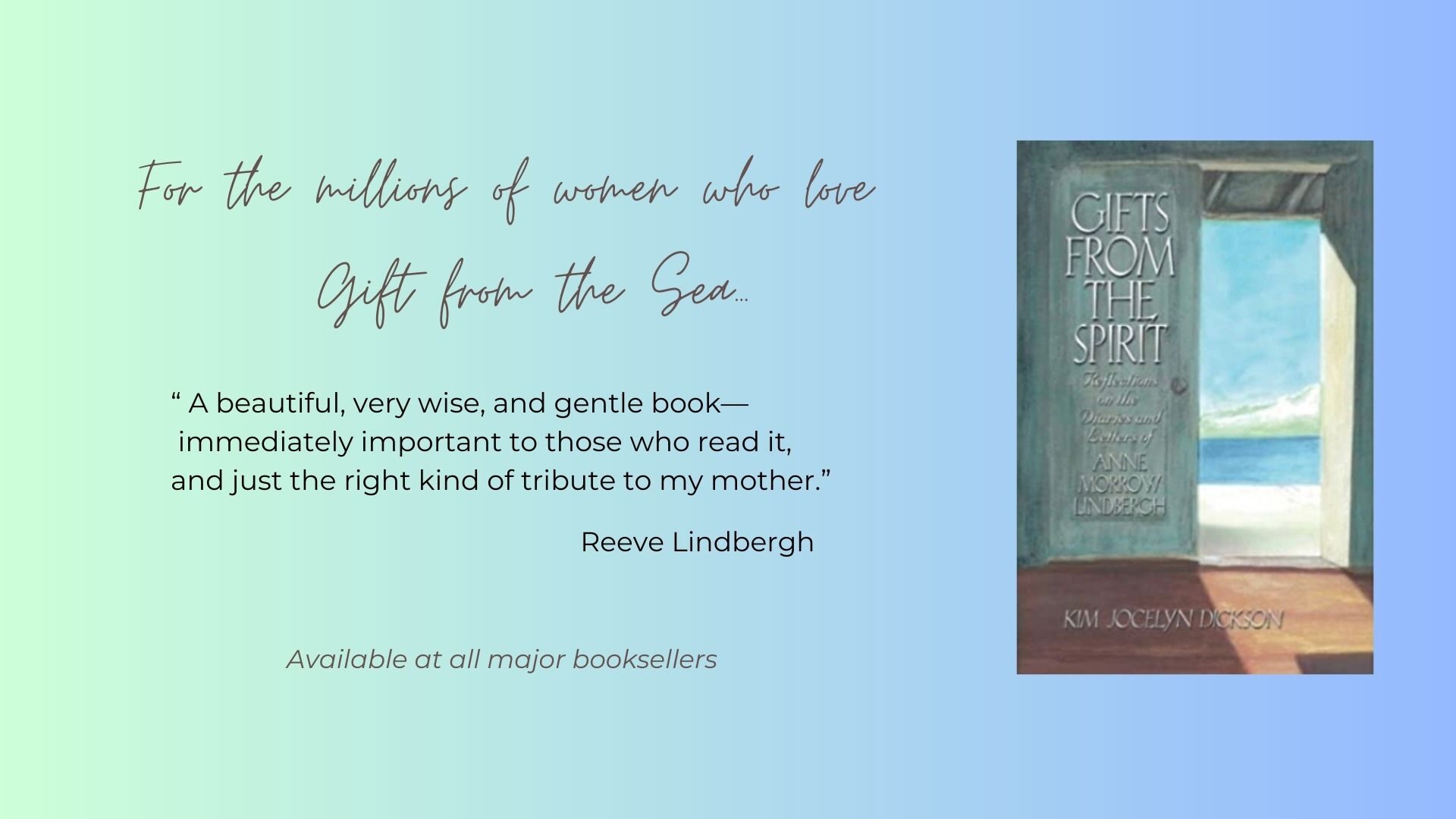 “When one finds a person who has the same thought as yours you cry out for joy, you go and shake him by the hand. Your heart leaps as though you were walking in a street in a foreign land and you heard your own language spoken, or your name in a room full of strangers.”
“When one finds a person who has the same thought as yours you cry out for joy, you go and shake him by the hand. Your heart leaps as though you were walking in a street in a foreign land and you heard your own language spoken, or your name in a room full of strangers.”
Anne Morrow Lindbergh: WAR WITHIN AND WITHOUT, p. 33
A picture of a young Anne Morrow Lindbergh sits on my desk. I clipped it from a second-hand bookstore copy of Hour of Gold, Hour of Lead and put it in a brass frame that once belonged to my grandmother. The picture of Anne’s sad face, photographed shortly after the kidnappingand murder of her baby boy, has been a companion for years. It sat on my desk when I lived in Princeton, New Jersey, and it is here on my desk in Southern California, where I live now, right next to a photograph of my grandmother.
It was my grandmother’s copy of Gift from the Sea that introduced me to Anne Morrow Lindbergh. This first edition teal-and-white volume rested untouched on a bookshelf at my parents’ home for years after my grandmother’s death when I was ten. During my teenage years I spent hours talking to my friends on the phone that hung on the wall next to this bookcase. I gazed at the binding of this book nearly every evening as I chatted, connecting to my friends, the world outside my family. Sometimes I even picked it up and looked at it, mildly curious about the woman married to the man for whom my high school was named. But I was not curious enough to read it. Not then anyway.
It wasn’t until my twenties–when I was home on vacation from graduate school at Princeton Seminary and preoccupied about my vocational future and a man in my life–that I pulled the book out to read. I was absorbed immediately. Maybe enchanted was more like it. It wasn’t just what she said–which spoke right to me–it was the way she said it. There was beauty in the way she used words. As I read on I was moved further.
Sparingly etched in blue ink throughout the book were underlines and an occasional exclamation mark: “The problem is not merely one of Woman and Career, Woman and the Home, Woman and Independence. It is more basically: how to remain whole in the midst of the distractions of life; how to remain balanced, no matter what centrifugal forces tend to pull one off center; how to remain strong…” [i] and “Woman must be the pioneer in this turning inward for strength…” [ii] and “…women need solitude to find the true essence of themselves…” [iii]
The markings were in my grandmother’s handwriting. It had been more than twenty years since her eyes and hand had swept across these same pages, but at that moment I felt she was with me. Anne Morrow Lindbergh’s words became a bridge for me, linking me to this woman I had loved so much and lost.
Discovering who my grandmother was through Anne’s words was important to me because in some way that seemed to tell me more about who I was too. It was reassuring to know that the grandmother who had meant so much to me when I was small thought about her inner life. Maybe this was why I’d felt so connected to her as a child.
When you find a person who has the same thought as yours, you want to get to know her better. My grandmother was gone, but there was much more I would learn about Anne Morrow Lindbergh.
After reading Gift from the Sea, I searched for anything and everything I could find by or about her. Most of Anne’s books were available at the Princeton public library, fortunately; they were nearly impossible to own, though, because nearly everything but Gift from the Sea and her one book of poetry, The Unicorn, were out of print. I became well acquainted with second-hand bookstores, and occasionally was lucky enough to find one of her books. Then the man I married conducted an all-out nationwide search–in the days before the Internet existed, mind you–and, amazingly, unearthed every hardcover volume I didn’t already own, surprising me with them for a wedding present. My collection was complete.
The dearth of availability was a mystery to me. While Gift from the Sea continued to sell millions all over the world and had become an inspirational classic, what about the rest of her work? Why was it out of print? And why was practically nothing written about her?
I discovered Anne Morrow Lindbergh’s work when I was a seminary student, struggling to learn more about the meaning of life and God–and myself. Privileged to be attending one of the best theological schools in the country, I studied with professors who were world-renowned and read widely in fields as diverse as psychology, philosophy, education, theology, Biblical studies, women’s studies, and history. But what I kept coming back to, what I really wanted to read, was more of Anne. Her work touched not only my mind, but my heart, too.
I was fascinated by the life she led. As a major twentieth-century figure married to an American icon, she was both a player in and witness to some of the most important historical events of her time. But what was even more remarkable than that, to me, was her inner life. Here was a woman who, in the eyes of the outside world, seemed to have it all. Raised with all the advantages her wealthy parents could give her, Ivy League educated, married to the most popular man in the world, she was talented and successful in her own right and became a best-selling author. But this wasn’t the whole picture.
The rest of the picture–the picture that emerged as I read her published diaries and letters, is that of a woman who was alienated from herself, who struggled to understand herself, her relationships, and her place in the world. I saw a woman who had not arrived, but was on a journey–a journey toward self-awareness.
Anne’s body of literary work follows the same theme: The journey of spiritual awareness–of coming home to yourself. Whether it’s her poetry, her prose, or her personal writings in her diaries and letters, she takes her reader by the hand, and graciously, companionably, points the way: Take the inner road, she says. The answers are inside you. My Post-It note-marked, scribbled in, underlined, and highlighted five volumes of Anne’s diaries and letters are scattered here on my desk today, right alongside my pictures of Anne and my grandmother. Bring Me a Unicorn; Hour of Gold, Hour of Lead; Locked Rooms and Open Doors; The Flower and the Nettle; and War Within and Without. These dog-eared, slightly yellowed, tattered book jacketed copies were second- hand to begin with, but they are treasures to me nonetheless, for what they meant to me as a young woman who was on the threshold of self-discovery and what they mean to me still.
Coming across Anne in these books was like meeting someone who spoke the same language I did. Her reflections resonated deep inside me: Yes. I know just what you mean. When I read Anne’s diaries and letters I felt less alone. Here was someone who struggled with the same things I struggled with, who put into words things I felt but could not articulate, who reminded me of some knowledge dormant inside me: that the things I long for are already within me. And who, by her example, gave me courage to get on with my own inner journey.
And so I did, and I’d like to share some of it with you. The passages you will read from Anne’s diaries and letters are thoughts of hers that I’ve returned to again and again over the past twenty years. These are the reflections and observations that leapt out at me, that something inside me said yes to. I wasn’t always conscious of why these thoughts seemed so true during my earliest readings. But as the years have gone by and I have understood more about myself, I understand more about her, too. The truth that I apprehended only dimly as a young woman has become clearer with time and self-awareness.
And so I offer one woman’s take on Anne Morrow Lindbergh–who she was and what her legacy is. I hope that in my personal reflections on Anne’s life and words and wisdom, you too may hear your own language spoken. Or your name in a room full of strangers.
(Excerpt from Gifts from the Spirit: Reflections on the Diaries and Letters of Anne Morrow Lindbergh, 2002, 2014, copyright Kim Jocelyn Dickson)
[i] Anne Morrow Lindbergh, Gift from the Sea (New York: Pantheon, 1955) p. 29.
[ii] Ibid. p. 57.
[iii] Ibid. p. 50.
